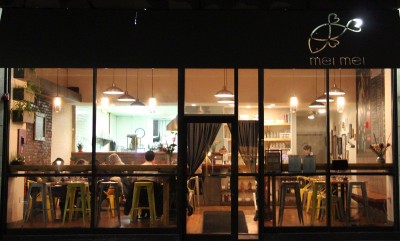Whether looking for a full meal or just a snack, businesspeople, college students and tourists alike flock to brightly-colored vehicles offering nearly every kind of food, from Vietnamese to Mexican to classic grilled-cheese sandwiches. Over the past several years, food trucks have grown from a novelty to an integral part of the culinary industry. Despite that evolution, brick-and-mortar restaurants — many of them with deep roots in Boston — aren’t too worried about the future.
John Caparella, owner of Italian restaurant Mother Anna’s, said that despite the rapid transformation of the industry, his restaurant has managed to adapt.
“It [the business] is doing fine,” he said. “We see a lot of changes, but the restaurant is doing well.”
The actual Mother Anna, Caparella’s grandmother, opened the Italian eatery in 1932 in Boston’s historic North End. Now, four generations of the Caparella family have been involved in the business. Through almost 83 years of serving the city’s people, the business has seen the restaurant landscape change. Caparella said the family tries to be competitive by offering food at reasonable prices.

“People like the comfort food,” he said. His hope is that customers will keep frequenting the restaurant for an authentic, homey Italian experience.
And while places like Mother Anna’s provide a more relaxing and slower dining experience, food trucks have stepped up to provide an alternative for those eating on the go. Boston saw its first food trucks in July 2011.
Rafael Carbonell, deputy director of the Office of Business Development for the City of Boston, said food trucks are not just great for patrons, but also for those willing to dream them up and run them.
“Entrepreneurs looking to get into the business see food trucks as an opportunity,” he said.
However, some food truck owners in Boston, Carbonell said, also want to own a restaurant. Trucks such as Clover Food Lab, Roxy’s Grilled Cheese, Bon Me and Mei Mei have all opened brick-and-mortar establishments around Boston. Carbonell said Clover, in particular, is an example of a food truck that saw a successful transition. The Cambridge company began its journey with one truck and seven employees and now has approximately 200 employees in multiple locations.
“Many use food trucks as a proof of concept and marketing opportunity,” Carbonell said. “Food trucks create a great opportunity to build a following.”
That transition process makes for an almost symbiotic relationship between trucks and restaurants, giving opportunity to more would-be restaurateurs. Steven Leibowitz, author of the Hub Food Trucks blog and self-described food truck lover, said the swell in Boston’s food truck culture has been noticeable.
“The first year [of Boston food trucks] in 2011, there were fewer than fifteen trucks in Boston. Now, there is 4 to 5 times that, and many new locations,” Leibowitz said in an email. He said the city has been making noticeable efforts to accommodate more vending spots. The Rose F. Kennedy Greenway in downtown Boston, for example, allows food trucks to operate within its space all year round with expanded space during the year’s warmer months.
Leibowitz said food trucks are not necessarily a threat to planted restaurants, but instead an asset.
“Several restaurants understand that a food truck helps expand their brand,” he said. “Paris Creperie, Redbones [BBQ], Posto and Tenoch Mexican are all examples of restaurants expanding into food trucks. And the numerous trucks who have expanded to a restaurant have stayed on the streets also. Mei Mei, Roxy’s and Pennypacker’s all have great trucks and restaurants.”
In Leibowitz’s eyes, owners who believe that food trucks are cutting into the business of their traditional restaurants are simply not competitive enough.
“If you are threatened by a truck with a small menu and no amenities, you’re probably not a good restaurant,” he said.
Still, he added, the future for food trucks — though bright — is not completely clear.
“I keep wondering when there will be a saturation point,” he said. “One thing I say to truck owners now [is] you need a plan outside of Boston, because there are only so many spots and an ever-expanding number of people hitting the streets, thinking this is their break. Some are good, some spectacularly fail.”
CORRECTION: A previous version of this story said the Rose F. Kennedy Greenway only provides space to food trucks during the warmer months. The story has been edited to reflect this change.




























































































































Charlie McCabe • Dec 4, 2014 at 3:10 pm
Hi, thanks for the article. I just wanted to note that food vending operates on the Rose Kennedy Greenway all year round, not just in the warm season. In fact, we’ve stepped up our efforts this month with a promotion we’re calling December @ Dewey. An increased number of food trucks and some retail fashion trucks on Thursday are out through December 24th. See http://www.rosekennedygreenway.org/visit/food/full-mobile-eats-calendar/ for the schedule. We’ll continue in Jan, Feb, and Mar and the new season will begin in April 2015.